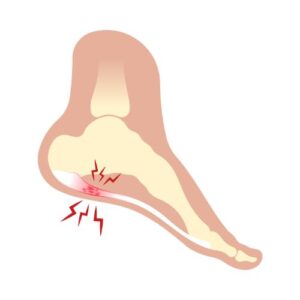is heel pain : a sign of cancer?
Heel pain is a common issue for many people, often caused by things like plantar fasciitis or overuse. However, persistent heel pain can sometimes be a sign of something more serious, including cancer. While cancer-related heel pain is rare, it’s important to understand the symptoms and when to seek medical advice.
What Causes Heel Pain?
Heel pain is a common issue that many people experience, and it can arise from various causes:
The most frequent cause of heel pain is plantar fasciitis, an inflammation of the thick band of tissue that runs along the bottom of the foot, causing pain at the heel, especially with the first steps in the morning.
Another common cause is heel spurs, which are bony growths on the underside of the heel bone that often accompany plantar fasciitis and cause pain during movement.
Tendonitis, particularly Achilles tendonitis, can also lead to heel discomfort, especially in athletes or individuals who engage in repetitive activities.
Stress fractures from overuse or high-impact activities can result in localised heel pain.
Bursitis, or inflammation of the bursa (fluid-filled sacs that cushion the joints), can also contribute to heel pain.
These conditions are typically treatable with rest, stretching exercises, and proper footwear, but if the pain persists, it’s essential to consult a healthcare provider to rule out more serious underlying issues.
Is Heel Pain : a Sign of Cancer?
While heel pain is most often associated with common conditions like plantar fasciitis or tendonitis, in rare cases, it can be a sign of something more serious, such as cancer. Heel pain related to cancer is typically associated with certain types of cancer that affect the bones or soft tissues in the heel:
–Bone cancer, such as osteosarcoma, can lead to localised pain in the heel as the tumor grows and affects the bone structure.
–Metastatic cancer, where cancer from other parts of the body (like breast, lung, or prostate) spreads to the bones, can cause pain in the heel or other bone areas.
–Soft tissue sarcomas, could also develop in or around the heel, leading to pain.
Although cancer-related heel pain is uncommon, it is important to seek medical attention if the pain is persistent, accompanied by other unusual symptoms, or doesn’t improve with typical treatments. Early detection of cancer can significantly improve treatment outcomes.
When is Heel Pain : a Sign of Cancer

Heel pain, although often linked to common conditions like plantar fasciitis or overuse, could also be a warning sign of cancer in some cases. If heel pain is persistent and doesn’t improve with rest or basic treatments, it may indicate a more serious underlying condition, including cancer. Cancer-related heel pain is often accompanied by other concerning symptoms such as :
- Persistent Pain: Pain that doesn’t improve with rest, ice, or basic treatments.
- Unexplained Weight Loss: If heel pain is accompanied by significant weight loss.
- Pain that Worsens at Night: Cancer-related pain often intensifies at night, whereas pain from other causes might improve with rest.
- Swelling or Redness: If there is swelling, redness, or warmth around the heel that doesn’t resolve, it could indicate an infection or tumor.
- History of Cancer: If the heel pain is unexplained or if it occurs in someone with a history of cancer, especially types that are known to spread to the bones (like breast or prostate cancer), it’s crucial to seek medical attention.
While heel pain alone is rarely linked to cancer, it’s important to monitor your symptoms and consult a healthcare professional for further evaluation if any of these red flags appear.
How Heel Pain from Cancer is Diagnosed
- Medical History and Physical Exam: The doctor will first review the patient’s medical history and perform a physical examination.
- Imaging Tests: X-rays, MRIs, or CT scans may be required to view the bones and soft tissues.
- Biopsy: If there’s a concern about cancer, a biopsy of the affected tissue may be performed to confirm the diagnosis.
- Blood Tests: These can help detect markers associated with certain cancers, especially in the case of metastatic cancer.
Treatment Options for Cancer-Related Heel Pain
Treatment options for cancer-related heel pain primarily depend on the type of cancer and its stage:
- Bone Cancer Treatment: If heel pain is caused by bone cancer, such as osteosarcoma, the primary treatment often involves surgery to remove the tumor or affected bone. This may be followed by chemotherapy or radiation therapy to target and shrink any remaining cancer cells.
- Metastatic Cancer: where cancer from another part of the body spreads to the bones, treatments may include targeted therapies, immunotherapy, or hormone therapy, depending on the type of cancer involved.
- Pain Management: is also a crucial part of treatment for cancer-related heel pain. Doctors may recommend pain relievers, anti-inflammatory medications, or nerve-blocking treatments to help alleviate discomfort. In some cases, physical therapy might be suggested to improve mobility and strength, especially if surgery or other treatments affect movement.
The goal of treatment is not only to manage pain but also to address the underlying cancer, aiming for the best possible outcome through a combination of medical and supportive care.
Prevention and Early Detection
- Regular Checkups: The importance of seeing a doctor for regular checkups, especially if you have a history of cancer or risk factors.
- Self-Exams and Awareness: Be aware of any changes in your body, including pain that lasts longer than expected.
- Healthy Lifestyle: Maintaining a healthy weight, exercising, and avoiding smoking can reduce the risk of developing certain cancers.

if you’re experiencing persistent heel pain or any of the symptoms mentioned in this post, it’s important to consult with a healthcare provider. Early detection is key to effective treatment, especially when cancer is a concern. Share your thoughts or questions in the comments below.
For more information on the link between bone pain and cancer, visit the American Cancer Society’s Guide on Bone Cancer.
More Topics on Cancer ? Click here







